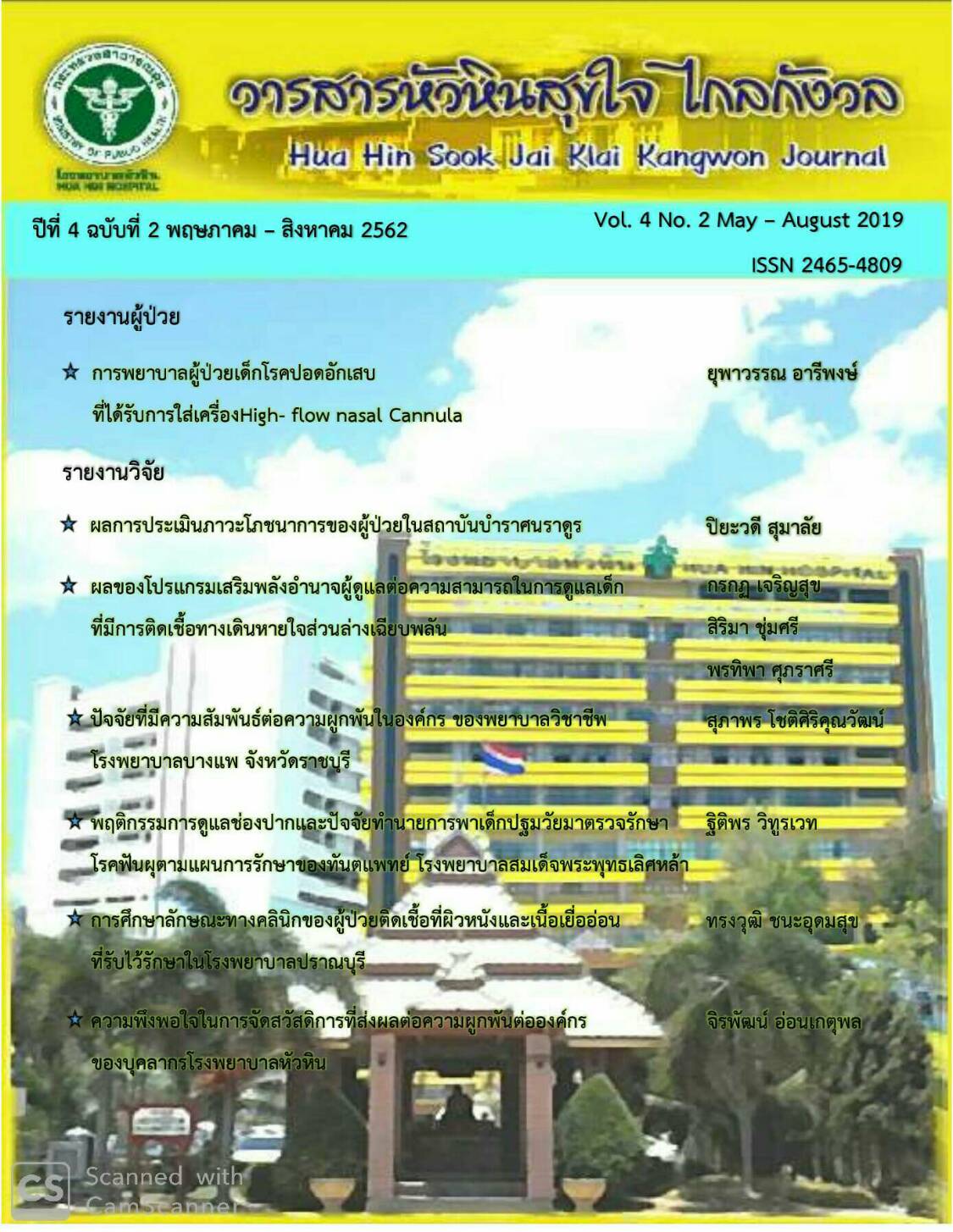Oral hygiene behavior and taking early childhood for dental caries according to treatment plan of the dentist at Somdejphraphutthaloetla Hospital
Oral hygiene behavior
Keywords:
early childhood, oral hygiene behavior, dental caries, treatment planAbstract
This crossectional research was to study oral hygiene behavior of early childhood, taking the early childhood for dental caries treatment according to the treatment plan, factors affecting the taking of early childhood for dental caries treatment according to the dentist's treatment plan, and problems and obstacles to bringing early childhood for dental treatment. The samples were 96 parents and 96 dental treatment record forms by purposive sampling. Data was collected by questionnaire (parents) and dental treatment record form in May - July 2019, and analyzed by using descriptive statistics, and multiple logistic regression analysis.
The results were as followings; 52.1% of parents had oral care behaviors of early childhood at moderate level, 29.1% and 18.8%, followed by high and low level, respectively. They took early childhood for dental caries treatment according to the treatment plan, 65.6%. Oral hygiene behavior early childhood of parents could predict the bringing of early childhood to the treatment plan, statistically significant (P-value = .01), but sex (female), age, education level (diploma or higher), travel expenses, cost of treatment, risk perception of dental caries, perception of severity of dental caries, recognizing the benefits of the prevention and treatment of dental caries, getting information about dental caries, and the ability to access services did not effect on taking the early childhood to the treatment plan of the dentist (P-value > .05). All variables could explain the variations to taking early childhood for dental caries according to treatment plan of the dentist, at 13.7%. Parents had problems and obstacles to bringing early childhood for dental treatment at 30.2%, problems encountered include lack of time to bring early childhood and early childhood refused to come at 16.7% and 13.5%, respectively.
According to such results, there should be improving the parents to be more accurate for oral care behavior, which will result in bringing more early childhood to complete dental caries treatment plans.
References
2.Yaseen Syed Mohammed, Nai k Saraswati , Uloopi KS. Ectopic eruption – A review & case report. J Contemporary Clinical Dent. 2011; 2:3-7.
3. Woodward, M., and Walker, A.R.P. Sugar consumption and dental caries: Evidence from90 countries. Br Dent J. 1994; 176:297-302.
4. Miller J, Vaughan-Williams E, Furlong R, AND Harrison L. Dental caries and children’s weights. Journal of Epidemiology and Community Health. 1982; 36:49-52.
5. ทัศนีย์ คุมมานนท์. อนามัยช่องปาก. ในคณะกรรมการกลุ่มผลิตชุดวิชาอนามัยชุมชน มหาวิทยาลัยสุโขทัยธรรมาธิราช (บก.), อนามัยชุมชน. นนทบุรี : คณะศิลปกรรมศาสตร์ มหาวิทยาลัยสุโขทัยธรรมาธิราช. 2548.
6. Beltrán-Valladares P, Cocom-Tum H, Casanova-Rosado JF, Vallejos-Sánchez AA, Medina-Solís CE, Maupomé G. Caries prevalence and some associated factors in 6-9-year-old schoolchildren in Campeche, Mexico. Rev Bioméd. 2006; 17: 25-33.
7. สำนักงานกองทุนสร้างเสริมสุขภาพ. โรคในช่องปากกับ 6 ช่วงวัย คุณเสี่ยงแค่ไหน. 2557. [อินเตอร์เน็ต] [วันที่อ้างถึง 15 มิถุนายน 2562] ที่มา: https://www.thaihealth.or.th/
8. สำนักทันตสาธารณสุข กรมอนามัย. รายงานผลการสำรวจสภาวะสุขภาพช่องปากระดับประเทศครั้งที่ 7 ประเทศไทย พ.ศ.2555. กรุงเทพฯ : โรงพิมพ์องค์การสงเคราะห์ทหารผ่านศึก. 2556.
9. Becker MH. The health belief model and sick role behavior. Health Educ Monographs, 1974; 2:409-17.
10. สุนิภา ชินวุฒิ. ปัจจัยที่มีผลต่อพฤติกรรมการดูแลสุขภาพช่องปากของผู้ปกครองเด็กก่อนวัยเรียนในศูนย์พัฒนาเด็กเล็ก. ชลบุรี : รายงานวิจัย, 2562.
11. สิรินันท์ ตั้งอยู่สุข. การพัฒนาโปรแกรมการมีส่วนร่วมของผู้ปกครองต่อพฤติกรรมการดูแลสุขภาพช่องปาก ในเด็กก่อนวัยเรียน.นนทบุรี: มหาวิทยาลัยสุโขทัยธรรมาธิราช. 2555.
12. วีระวุฒิ วงศ์วันดี. พฤติกรรมของผู้ปกครองในการดูแลสุขภาพช่องปากเด็กก่อนวัยเรียนในศูนย์พัฒนา เด็กเล็ก เทศบาลอากาศอำนวย อำเภออากาศอำนวย จังหวัดสกลนคร. กรุงเทพฯ: มหาวิทยาลัยราชภัฎพระนคร. 2554.
13. Pender NJ. Health Promoting in Nursing Practice. 2nd ed. U.S.A.: Appleton & Lange. 1987.
Downloads
Published
How to Cite
Issue
Section
License
บทความที่ได้รับการตีพิมพ์ในวารสารหัวหินเวชสาร เป็นลิขสิทธิ์ของโรงพยาบาลหัวหิน
บทความที่ลงพิมพ์ใน วารสารหัวหินเวชสาร ถือว่าเป็นความเห็นส่วนตัวของผู้เขียนคณะบรรณาธิการไม่จำเป็นต้องเห็นด้วย ผู้เขียนต้องรับผิดชอบต่อบทความของตนเอง






